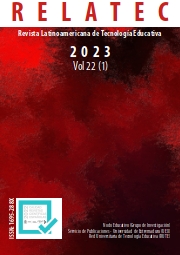Affects and effects of the pandemic on higher education in Mexico
DOI:
https://doi.org/10.17398/1695-288X.22.1.73Keywords:
Affections, Pandemic, University, Subjectivity, School device, COVID-19Abstract
Since the pandemic, workers, teachers and students have faced countless adjustments and the gradual return to face-to-face activities. In order to investigate deeply about the experiences of the return to face-to-face classes, we have recovered 60 narrations of students from two public universities in México who elucidate the complexity and effects on modes of subjectivation. The material obtained has been systematized through grounded theory and the analysis was contrasted from the theory of deleuzian affections, as well as theoretical approaches that problematize socialization and sociality in face-to-face classes, its effect on learning processes and the role of the university institution and the school device. The results are presented in four central categories: impressions and opinions about the return to face-to-face classes; the affections and sensations caused by the pandemic and the face-to-face return; the virtual and face-to-face classes; and the hybrid model.
Downloads
References
Albuquerque, R. S. de (2021). Educação em tempos de pandemia: sentimentos e percepções dos professores. Ensino Em Perspectivas, 2(4), 1–5. https://revistas.uece.br/index.php/ensinoemperspectivas/article/view/6714
Arancibia, M. L., Cabero, J., & Marín, V. (2020). Creencias sobre la enseñanza y uso de las tecnologías de la información y la comunicación (TIC) en docentes de educación superior. Formación universitaria, 13(3), 89-100.
Cáceres-Muñoz, J., Jiménez Hernández, A. S., & Martín-Sánchez, M. (2020). Cierre de Escuelas y Desigualdad Socioeducativa en Tiempos del Covid-19. Una Investigación Exploratoria en Clave Internacional. Revista Internacional De Educación Para La Justicia Social, 9(3), 199–221. https://doi.org/10.15366/riejs2020.9.3.011
Castoriadis, C. (2013). La institución imaginaria de la sociedad. México: Tusquets.
De Sousa Santos, B. (2020). La cruel pedagogía del virus. CLACSO.
Deleuze, G. (24 de enero 1978). Curso sobre Spinoza. (E. Hernández, Trad., & R. Marginales, Recopilador)
Vincennes, Val de Marne, Francia. Obtenido de http://reflexionesmarginales.com/3.0/wp-content/uploads/2013/01/Gilles-Deleuze-Curso-Sobre-Spinoza.pdf
Deleuze, G. (1996). Spinoza y el problema de la expresión. Barcelona: Muchinik.
Deleuze, G. (2005). La Isla Desierta y otros textos. Textos y entrevistas 1953-1974. Valencia: Pre-Textos.
Deleuze, G. (2007). Dos regímenes de locos. Valencia: Pre-textos.
Dubet, F. y Martuccelli, D. (1998). En la escuela. Sociología de la experiencia escolar. Buenos Aires: Losada.
Echeverría, B. (2011). Crítica de la modernidad capitalista. La Paz: OXFAM; Vicepresidencia del Estado Plurinacional de Bolivia.
Escudero-Nahón, A. (2019). Intermodalidad educativa: propuesta de desarrollo conceptual con una revisión sistemática y una cartografía conceptual. Desafíos educativos, 3(6), 19-28.
Gobierno de México (2020). Se declara como emergencia sanitaria la epidemia generada por COVID-19. https://coronavirus.gob.mx/medidas-de-seguridad-sanitaria/
Hodges, C., Moore, S., Lockee, B., Trust, T. & Bond, A. (2020). The difference between emergency remote teaching and online learning. Educause Review. Recuperado el 21 de noviembre de 2022, de https://bit.ly/3b0Nzx7
Lourau, R. (2001). El análisis Institucional. Buenos Aires: Amorrortu.
Meirieu, F. (18 de abril de 2020). La escuela después… ¿con la pedagogía de antes? Recuperado el 23 de noviembre de 2022, de http://www.mcep.es/2020/04/18/la-escuela-despues-con-la-pedagogia-de-antes-philippe-meirieu/?utm_campaign=shareaholic&utm_medium=twitter&utm_source=socialnetwork
Moreno Hernández, H. C. (2017). Producciones éticas de los estudiantes frente a la experiencia escolar: conflictos y violencias. Argumentos, (3)84, 99-118. https://www.redalyc.org/pdf/595/59552650006.pdf
OMS (2022). La OMS caracteriza a COVID-19 como una pandemia. https://www3.paho.org/hq/index.php?option=com_content&view=article&id=15756:who-characterizes-covid-19-as-a-pandemic&Itemid=1926&lang=es#gsc.tab=0
Onyema, E. M., Eucheria, N. C., Obafemi, F. A., Sen, S., Atonye, F. G., Sharma, A., & Alsayed, A. O. (2020). Impact of Coronavirus pandemic on education. Journal of Education and Practice, 11(13), 108-121.
Orton-Johnson, K., & Prior, N. (comps.) (2013). Digital Sociology: Critical Perspectives. Houndmills: Palgrave Macmillan.
Pacheco, J. A., Morgado, J. C., Sousa, J., & Maia, I. B. (2021). Educação básica e pandemia. Um estudo sobre as perceções dos professores na realidade portuguesa. Revista Iberoamericana de Educación, 86(1), 187-204.
Secretaría de Educación Pública (20 de agosto de 2021). Acuerdo número 23/08/21, en Diario Oficial de la Federación. https://www.dof.gob.mx/nota_detalle.php?codigo=5627244&fecha=20/08/2021#gsc.tab=0
Secretaría de Salud (s.f.). Calendario de vacunación. Recuperado el 8 de septiembre de 2022 de https://vacunacovid.gob.mx/calendario-vacunacion/
Strauss, A. y Corbin, J. (1998). Bases de la investigación cualitativa. Técnicas y procedimientos para desarrollar la teoría fundamentada. Antioquia: Universidad de Antioquia.
Taylor, S. J. y Bogdan, R. (1987). Introducción a los métodos cualitativos de investigación. La búsqueda de sentido. México: Paidós.
UAM (2022). Historia de la UAM Xochimilco. Recuperado en: https://www.xoc.uam.mx/acerca-uam-historia
Van Dijk, J. (2013). Inequalities in the Netwok Society. En K. Orton-Johnson y N. Prior. (comps.), Digital Sociology: Critical Perspectives (pp. 105-124). Houndmills: Palgrave Macmillan.
Vygotsky, L. S. (1995). Pensamiento y Lenguaje. Teoría del desarrollo cultural de las funciones psíquicas. Ediciones Fausto.
Downloads
Published
Issue
Section
License
Authors who publish in this journal accept the following conditions:
1. The Author retains copyright in the article. Upon acceptance of the article, the author shall grant to the Publisher the right of first publication of the article. with the dcoument registered with the Creative Commons Attribution-NonCommercial-NoDerivative 4.0 International (CC BY-NC-ND) license, which allows to third parties to use what is published whenever they mention the authorship of the work and the first publication in this journal.
2. Authors can make other independent and additional contractual agreements for the non-exclusive distribution of the article published in this journal (eg, include it in an institutional repository or publish it in a book) provided they clearly indicate that the work was published for the first time in this journal.
3. Authors are allowed and recommended to publish their work on the Internet (for example on institutional or personal pages) before and during the review and publication process, as it can lead to productive exchanges and a greater and faster diffusion of published work (see The Effect of Open Access).









